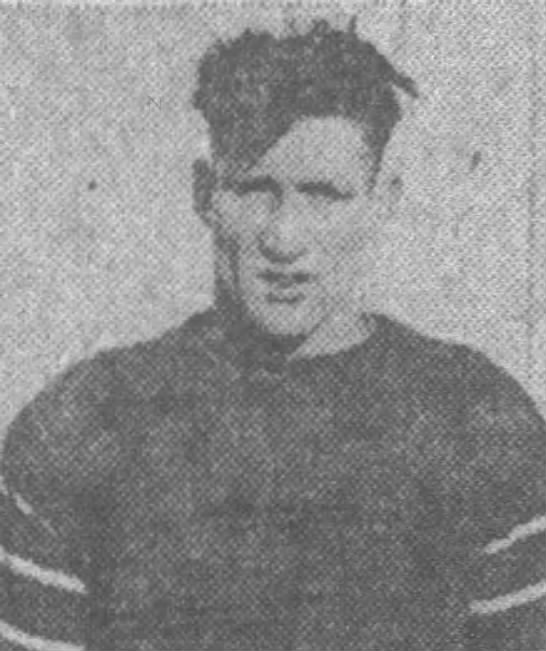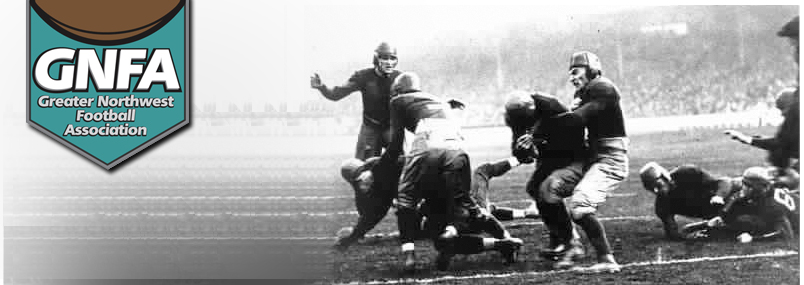|

Thomas A. "Tommy" Weir
Centerville Highlanders, Englewood
Blues, Butte Ramblers, US Army A.E.F
Fullback / Linebacker / Punter
1909 - 1927
Los Angeles Professional "Angels"
1926
When he broke into "semi pro" football as a 16-year old
reserve end for the Butte Ramblers, the skinny 135-pounder
was just "Johnny's brother" to most Butte fans. Johnny
being his older brother, the star halfback of Butte in 1909.
Cutting his teeth in the early years of ironman football, Tommy
suffered a broken ankle in the first game of the 1910 season
and watched as brother Johnny thrilled the fans with his
long runs from scrimmage and booming punts. For six
seasons Tommy played second-billing to Johnny as the
Ramblers contended for and claimed the 1912 Butte City
League championship developing a rivalry with the
Centerville Young Men's Club team. Centerville would
win the title in 1914 and not relinquish it for a decade.
The Butte Ramblers squad gave way to the East Side Athletic
Club, and Tommy began to get some action in the backfield,
having added some weight as he opened holes for his brother
in 1915 and 1916. The tough-as-nails baseball catcher
was just coming into his own when war broke out and the
United States mobilized. Tommy was one of the first to
register and was accepted into the US Army Artillery, Johnny
joined the Navy and became a 2nd Class Firefighter on the
USS New York battle cruiser. By now, Tommy was a
strapping 192-pounder in the prime of fitness.
Consigned to the 11th Artillery B Battery, Weir played
division football and helped lead the soldiers to the Border
Championship and while in France, was part of the 6th Army
Division team that took part in the 1919 American
Expeditionary Forces (AEF) championship tournament held in
Belgium, France and Germany. The tournament was part
of the Armastice celebrations when the guns of World War I
were silenced. His 6th Division team was knocked out
by the 81st Division in the February 1919 semi-final rounds
in a game played in Antricourt, France, but Weir was labeled
as the "best army punter in France". Earlier in 1918,
brother Johnny was aboard the USS New York and witnessed the
surrender of the German fleet.
Both brothers returned to the States, Johnny to the Puget
Sound Naval base in Washington, and Tommy finished out his
tour being discharged in June 1919. The tragic news
followed in August, Johnny was not coming home having
contracted meningitis, the elder Weir died in the Puget
Sound Naval hospital. They would not be playing
football and baseball together any longer.
Friends and war veterans convinced Weir to get back on the
field and take over where brother Johnny left off.
After last appearing on a Butte field in 1916, Tommy laced
up in November of 1919 and got the blood moving again with
the Meaderville Men's Club team. At 27-years old, most
men of the era were well on their way to a career and
family, but the former artilleryman turned explosives-expert
miner, burned his extra energy on the gridiron, stepping out
of the shadows of the elder Weir, and carving his own name
in the football spotlights. This was the era of the
two-way player and under-20 man rosters with very few
substitutions. It fit Tommy Weir perfectly as he
rarely came off the field. Except on those rare
occassions when he knocked himself out dishing out one of
his hard tackles on opposing runners that would leave both
men wobbly.
When the Meaderville team moved to join the newly formed
Englewood Blues, Weir went with them and began his ascent as
one of the hardest line-smashing fullbacks and hardest
hitting defenders in league
history, eventually garnering the nickname "Sheet Iron".
Those efforts did not go unnoticed and after the 1920
season, Gonzaga College came calling wanting the services of
the near-30-year-old fullback. An all-around athlete,
Weir set a league baseball record in the spring of 1921 with
88 bases hit for, a plus .400 batting average including 8 home runs, while being one of
the best punters and drop-kickers in the region.
Weir started at fullback for Gonzaga in 1921 and upon
completion of the season, returned to Butte where he
rejoined the Englewood team earning All-City honors as the
top fullback and linebacker, blessed with a knack for
punting and kicking. Being a problem for the
Centerville Highlanders in their battles with Englewood, the Centerville
team gained the services of Weir and for the next three
seasons Tommy claimed the All-City-All-Star fullback
position at season end of 1922, 1923 and 1924. Tommy
Weir set a number of punting records including an astounding
23 punts in one game for over 700 yards in field position
change as well as scoring a record 50-yard drop kick field
goal in 1922. In a December 1922 write up in The
Anaconda Standard proclaimed Weir "the most valuable man for
any squad".
Then he turned pro. Yes, at 33-years-old, Weir not
only planned to get married in 1925, he was also recruited
to play in a fledgling professional football league in
California. The Los Angeles "Angels" signed Weir and
he played through the 1926 season. The Los Angeles team
folded up after four games giving way to the undefeated
Hollywood Generals that would go on to play the New York
Football Yankees. Returning to Butte, Weir decided he
had one more season of football in him.
With the 1927 Centerville Highlanders, former 10-time Butte
City League champions, Weir led his team as the starting
fullback but gave way on the punting and kicking duties to
Ralph Olsen who would etch his name in the punting record
books alongside his legendary mentor. Tommy would be
voted Second Team All-City fullback, his fifth official
honor AFTER the age of 29.
After playing for 17-years, interrupted briefly by war, Weir
hung up his gear and became a Silver Bow deputy sheriff
under his brother Larry for $150 per month, resigning in
January of 1935 to work for the various Butte mining
companies. The War Veteran was one of the most
recognizable and resepected athletes in Butte history at the
time and had not only etched his own name as one of the most
beloved in the city, but elevated the Weir family name to
rival the Meglen brothers as Montana football royalty.
Weir passed away in August of 1944 after a long illness at
Fort Harrison Veteran's hospital near Helena, MT.
Minor League Honors
1916 Butte All-City Second Team End (East Side Athletic
Club)
1920 Butte All-City Second Team Fullback (Englewood)
1921 Butte All-City Fullback (Englewood)
1922 Butte All-City Fullback (Centerville)
1922 Butte Independent League MVP
1923 Butte All-City Fullback (Centerville)
1924 Butte All-City Fullback (Centerville)
1927 Butte All-City Second Team Fullback (Centerville)
|



